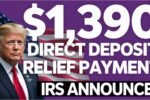Talks about a $2,000 direct deposit for eligible U.S. citizens in November 2025 have gained widespread public interest. While this proposed payment could offer valuable financial support to millions, it is important to note that the payment has not yet been officially approved by the federal government or the IRS.
However, early planning discussions indicate that if the program is authorized, the IRS may be prepared to process payments quickly. To help you stay informed and ready, here’s a clear, simple guide on anticipated eligibility, projected payment timeline, and preparation steps based on IRS guidelines.
Current Status – Has the $2,000 Payment Been Confirmed?
| Status | Details |
|---|---|
| Officially Approved | No |
| Under Discussion | Yes |
| IRS Preparing Systems | Reportedly |
| Final Approval Expected | Mid–2025 (if passed) |
| Earliest Payment Date | November 2025 (estimated) |
In summary: The payment is currently a proposal—not guaranteed yet.
Expected Eligibility Criteria (If Approved)
Eligibility requirements are expected to be similar to past financial relief programs.
| Qualification | Expected Requirement |
|---|---|
| Citizenship | U.S. citizen or legal resident |
| Identification | Valid Social Security Number or ITIN |
| Income Limit | Up to $75,000/year (individual)Up to $150,000/year (joint) |
| Tax Filing | Must have filed 2023 or 2024 federal tax return |
| Federal Benefits | Recipients of Social Security, SSI, SSDI or VA benefits may qualify automatically |
| Residency | Must live in the U.S. for most of the year |
Final eligibility rules will be announced only if the payment receives approval.
Estimated Payment Dates
| Stage | Estimated Time |
|---|---|
| Government Approval | Mid–2025 |
| IRS Processing Setup | October 2025 |
| Direct Deposits Begin | November 2025 |
| Paper Checks or Debit Cards | Late Nov – Dec 2025 |
Those with direct deposit already on file with the IRS would likely receive funds first.
How Will the Payment Be Sent?
| Payment Type | Likely Recipients |
|---|---|
| Direct Deposit | Most eligible taxpayers |
| Paper Check | Those without bank details on file |
| Debit Card (possible) | Some Social Security or SSI recipients |
No application expected for most individuals
Non-filers may need to submit simplified information later
IRS Instructions – How to Prepare
You don’t need to take action yet, but doing the following may help avoid delays if the program is approved:
- File your 2024 tax return on time
- Update your direct deposit information with the IRS
- Confirm your mailing address is current
- Log into or create your IRS online account
- Stay alert – avoid emails, calls or texts asking for personal or banking details
The IRS never contacts individuals by phone, text, or email to request bank or Social Security numbers.
Why there are problems (and why it’s not guaranteed)
- The tariff-dividend idea is still a proposal: legislation, funding allocation, and regulatory design are needed before it can become a reality.
- Analysts warn that revenue from tariffs may not yet be enough to pay $2,000 to millions of people.
- Legal and administrative work remains: eligibility rules, exclusion criteria, payment mechanisms—all must be resolved before rollout.
Final Thought
The $2,000 Direct Deposit for U.S. Citizens in November 2025 could offer vital financial support—but it is not officially approved yet. The smartest step right now is to stay informed, keep your IRS details updated, and follow only official government announcements.
Preparation today ensures faster payment processing if the program becomes active tomorrow.
Want to Be Ready If Approved?
Let me know if you’d like:
A printable eligibility checklist
A reminder when official updates are announced
Help checking or setting up your IRS online account
Frequently Asked Questions($2,000 Direct Deposit for U.S. Citizens in November 2025)
Q1. Is the $2,000 direct deposit guaranteed?
No. It is still under review by federal authorities.
Q2. Will Social Security or SSI recipients receive it automatically?
Possibly yes, if approved and paid through existing benefit systems.
Q3. Do I need to apply?
Likely not, unless you have not filed taxes in recent years.
Q4. Who will receive the payment first?
Individuals using direct deposit records registered with the IRS.
Q5. Will it affect Social Security or disability benefits?
No. It would be separate and not deducted from existing payments.






